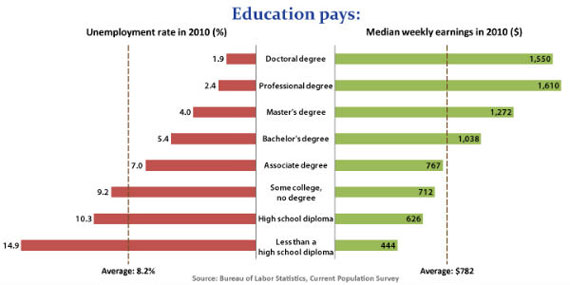There’s plenty of chatter and hand-wringing these days about whether it really makes sense to get a college education. The fact that recent grads are having such a tough time landing career jobs in today’s abysmal job market, along with the Occupy movement’s focus on student loan debt, has helped fuel the conversation.
RELATED: Want to Be Unemployed? Get This College Degree
Both are indeed serious problems; one is transitory (a stalled job market), the other seemingly systemic (college costs racing well ahead of inflation). But that doesn’t in any way change this basic fact: a college education is, indeed, of great value. I’m not just talking about the well-trod factoid that college grads on average earn about $1 million more over the course of their career than non-grads. What’s also important to understand is that college grads have stickier jobs. While the overall national unemployment rate recently dropped to 8.3 percent today, it’s just 4 percent for the slice of the population at least 25 years old with a college degree.
The telling graphic below, courtesy of the U.S. Bureau of Labor Statistics, makes quite the case for staying in school past high school. (It’s based on 2010 employment and wage data, but the same relationship persists today):

It seems to me that rather than frame the discussion as, Is college worth It?, the more constructive conversation that should be going on in every family is this: What college makes the most financial sense for us? College makes tremendous sense, but not at any cost. The degree that can be had without putting both the student and their parents deep into debt — with or without a 529 savings plan — should be highly prized. Maybe that’s the in-state school over the private. Or maybe it’s School Choice B that offers a far better financial aid package than School Choice A.
This story originally ran on Daily Capital .




